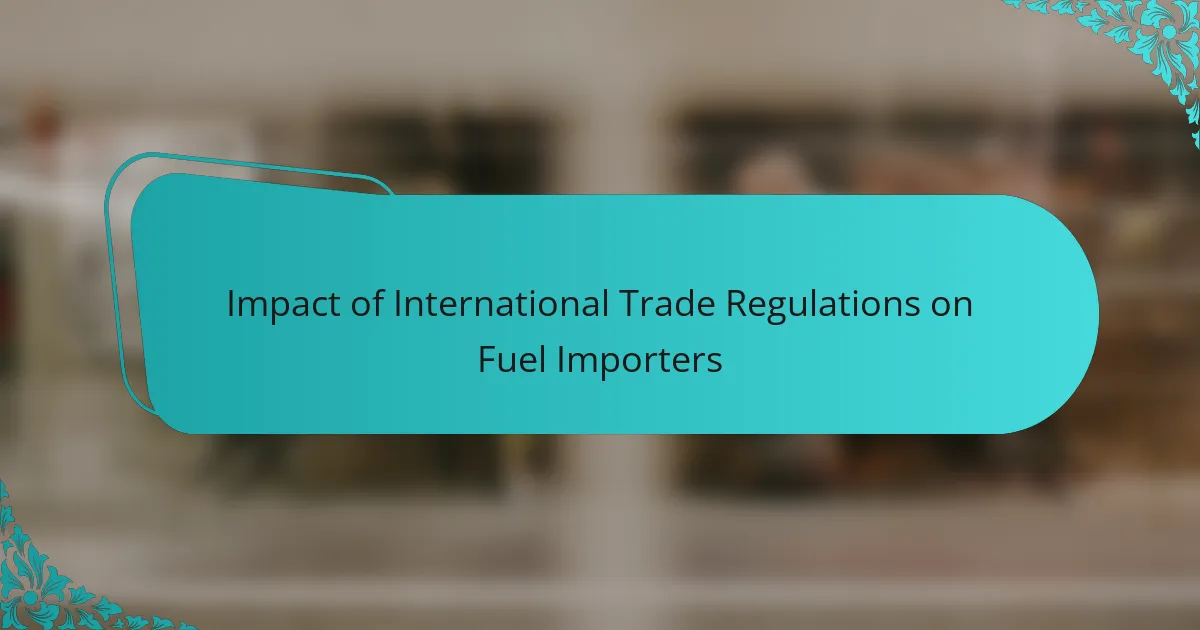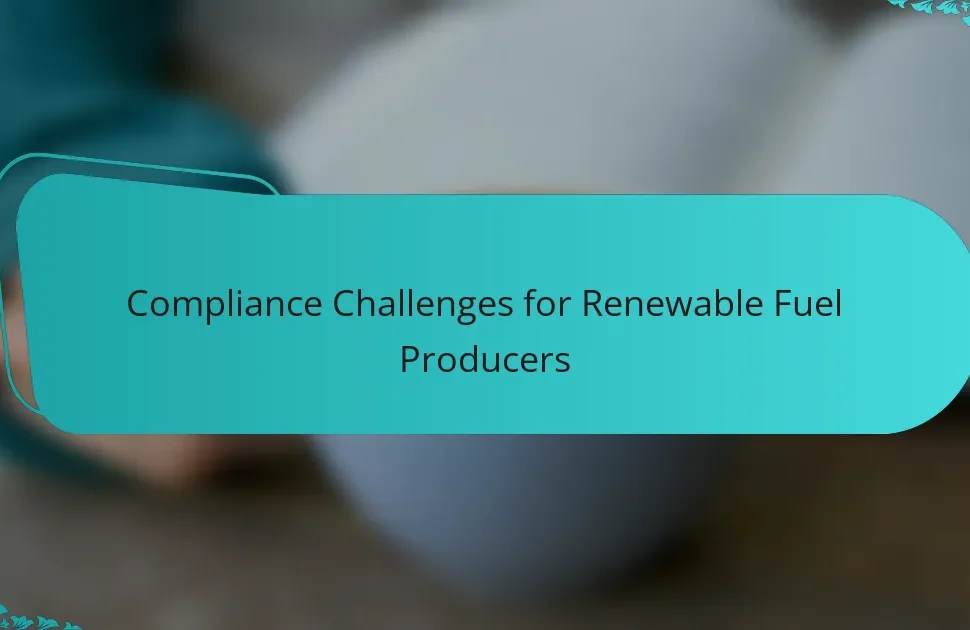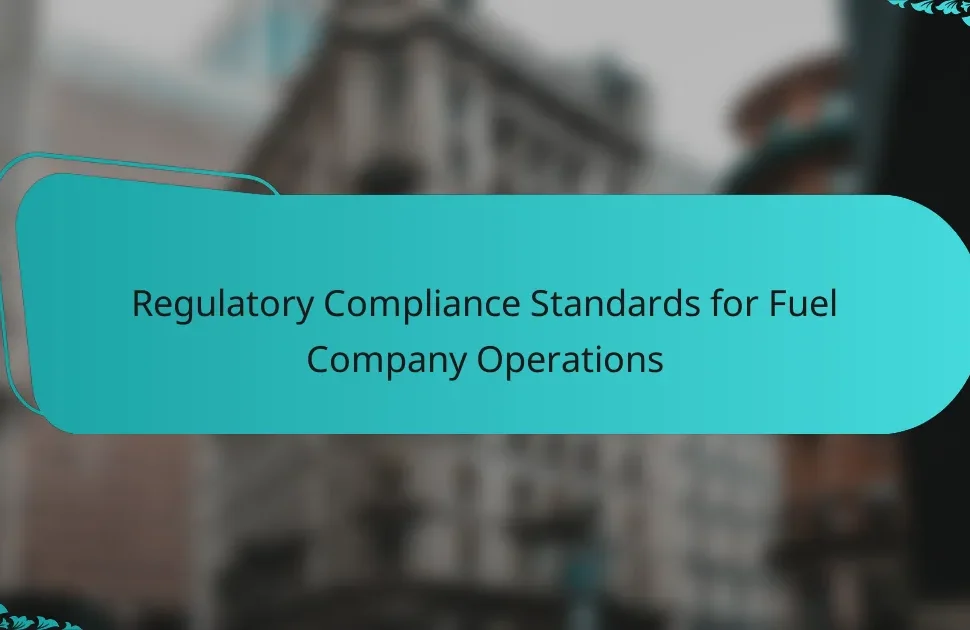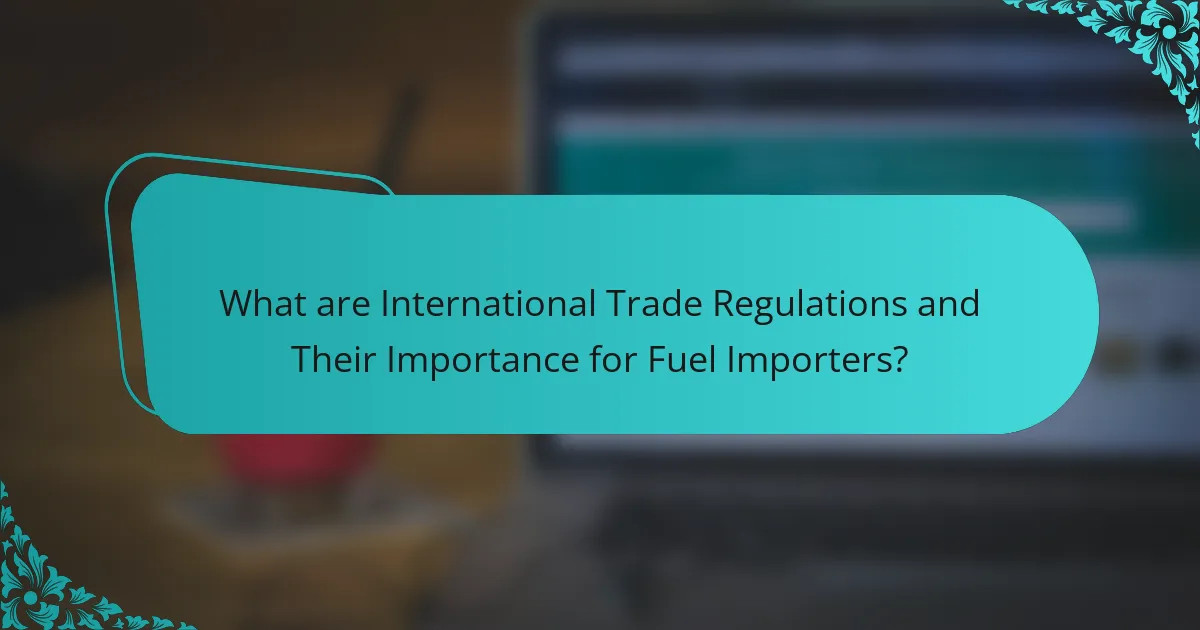
What are International Trade Regulations and Their Importance for Fuel Importers?
International trade regulations are rules and laws that govern the exchange of goods and services across borders. These regulations ensure compliance with safety, quality, and environmental standards. For fuel importers, adherence to these regulations is crucial. Non-compliance can lead to significant penalties, including fines and shipment delays. Additionally, trade regulations can affect pricing and availability of fuel in different markets. For instance, tariffs may increase costs, impacting profitability. Furthermore, regulations often dictate the documentation required for imports, influencing operational efficiency. Understanding these regulations helps fuel importers navigate complex international markets effectively.
How do International Trade Regulations affect the fuel import industry?
International trade regulations significantly impact the fuel import industry. These regulations govern tariffs, quotas, and standards for fuel imports. Compliance with these rules can affect the cost and availability of imported fuel. For example, high tariffs can increase import prices, leading to higher costs for consumers. Additionally, regulatory standards can limit the types of fuel that can be imported. Countries may impose environmental regulations that restrict certain fuels. Such regulations can shift market dynamics and influence trade relationships. In 2020, the U.S. imposed tariffs on oil imports from specific countries, affecting supply chains. Overall, international trade regulations shape the operational landscape of the fuel import industry.
What specific regulations impact fuel importers?
Fuel importers are impacted by several specific regulations. These include customs regulations, tariffs, and import quotas. Customs regulations dictate the documentation and procedures required for importing fuel. Tariffs are taxes imposed on imported fuel, affecting overall costs. Import quotas limit the amount of fuel that can be imported within a certain period. Environmental regulations also play a significant role. These regulations ensure that imported fuel meets specific environmental standards. Compliance with international agreements, such as the Paris Agreement, influences fuel import practices. Additionally, safety regulations govern the transportation and storage of imported fuel. Each of these regulations shapes the operational landscape for fuel importers.
How do trade agreements influence fuel import regulations?
Trade agreements significantly influence fuel import regulations by establishing tariff rates and import quotas. These agreements often reduce or eliminate tariffs, making imported fuel more affordable. For instance, the North American Free Trade Agreement (NAFTA) lowered tariffs on fuel imports among the U.S., Canada, and Mexico. This led to increased cross-border fuel trade. Additionally, trade agreements can set standards for fuel quality and environmental regulations. Compliance with these standards is often necessary for market access. Countries may also negotiate specific provisions regarding supply security and energy cooperation. Such provisions can enhance energy security and stabilize fuel prices. Overall, trade agreements shape the legal framework governing fuel imports, affecting both costs and availability.
What challenges do fuel importers face due to International Trade Regulations?
Fuel importers face several challenges due to international trade regulations. Compliance with varying regulations across countries can be complex. Each nation has its own import tariffs and quotas. These can significantly affect pricing and availability. Additionally, documentation requirements can be extensive and time-consuming. Importers must ensure they meet safety and environmental standards. Failure to comply can result in fines or shipment delays. Political instability in exporting countries can also disrupt supply chains. Furthermore, changes in trade agreements can create uncertainty in the market.
What are the compliance costs associated with these regulations?
Compliance costs associated with international trade regulations on fuel importers include expenses for documentation, legal fees, and compliance training. These costs can vary significantly based on the complexity of the regulations. For instance, obtaining necessary permits and licenses incurs direct costs. Additionally, companies may face costs related to audits and inspections. According to a report by the World Bank, compliance costs can range from 1% to 5% of the total value of imports. These figures highlight the financial burden placed on fuel importers due to regulatory compliance.
How do changing regulations affect market stability for fuel importers?
Changing regulations can significantly impact market stability for fuel importers. Regulatory changes can lead to fluctuations in import costs and supply availability. For instance, stricter environmental regulations may increase compliance costs for importers. This can result in higher fuel prices for consumers. Additionally, tariffs and trade agreements can alter the competitive landscape. Such changes may force importers to adapt quickly to maintain profitability. Historical examples show that sudden regulatory shifts can lead to market volatility. In 2020, changes in U.S. tariffs affected fuel import volumes, demonstrating the direct link between regulation and market stability.
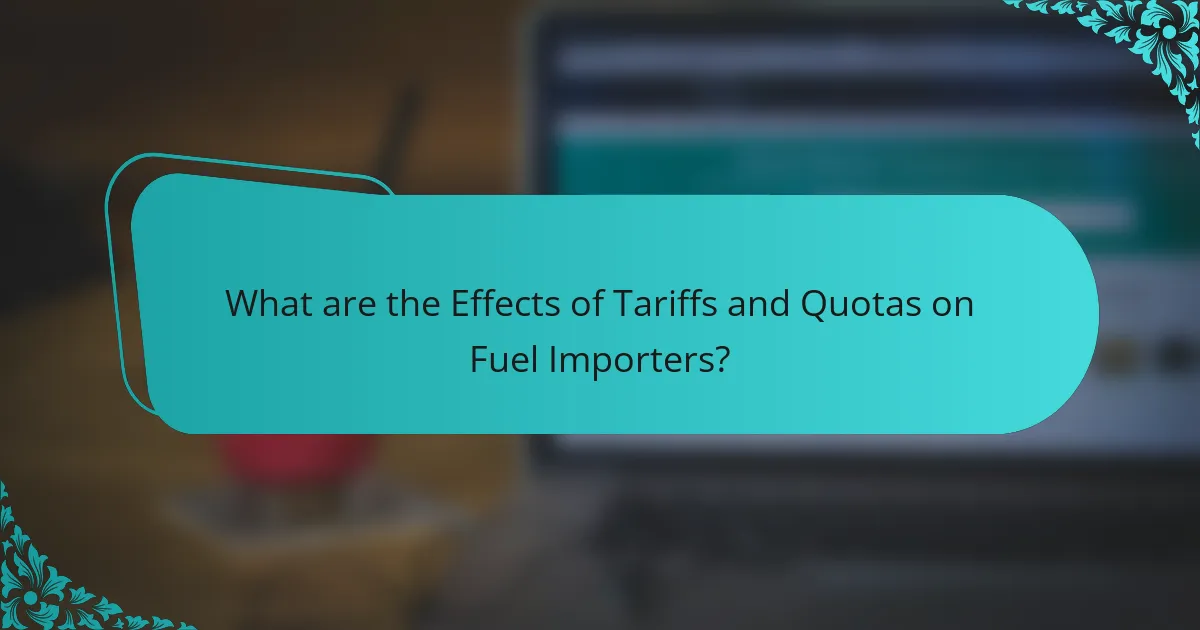
What are the Effects of Tariffs and Quotas on Fuel Importers?
Tariffs and quotas significantly impact fuel importers by increasing costs and limiting supply. Tariffs raise the price of imported fuel, making it more expensive for importers to acquire necessary resources. This can lead to higher retail prices for consumers and reduced demand. Quotas restrict the volume of fuel that can be imported, limiting the availability of fuel in the market. As a result, importers may struggle to meet domestic demand. Historical data shows that countries imposing tariffs on fuel imports often experience increased domestic prices and reduced consumption. For instance, the U.S. imposed tariffs on steel imports, leading to higher prices across various industries, illustrating a similar effect.
How do tariffs impact the pricing of imported fuel?
Tariffs raise the cost of imported fuel. When a government imposes tariffs, it adds a tax to the price of fuel from other countries. This increased cost is typically passed on to consumers. For example, if a country imposes a 10% tariff on fuel imports, the price for consumers rises by that percentage. As a result, domestic fuel prices can increase, leading to higher transportation and heating costs. Historical data shows that tariffs can lead to significant price fluctuations. According to the U.S. Energy Information Administration, tariffs on oil can directly affect pump prices. Thus, tariffs directly influence the pricing structure of imported fuel.
What are the effects of tariffs on consumer prices?
Tariffs increase consumer prices by raising the cost of imported goods. When tariffs are imposed, importers pass these additional costs onto consumers. This leads to higher retail prices for products that rely on imported components or raw materials. For example, a 25% tariff on steel can raise the price of automobiles, as steel is a key material. Historical data shows that following the steel tariffs in 2018, prices for affected goods rose significantly. In 2019, the Consumer Price Index for affected categories increased by 3.3%. Thus, tariffs directly contribute to higher consumer prices through increased costs for businesses.
How do tariffs influence the competitive landscape for fuel importers?
Tariffs significantly alter the competitive landscape for fuel importers. They increase the cost of imported fuel, making it more expensive for importers to source products. Higher costs can lead to increased prices for consumers, reducing demand. Domestic fuel producers may benefit from reduced competition as tariffs create a price advantage. This can encourage investment in local production facilities. Conversely, fuel importers may seek alternative markets or suppliers to mitigate tariff impacts. Tariffs can lead to trade disputes, further complicating the market. Overall, tariffs reshape pricing strategies and market dynamics among fuel importers.
What role do quotas play in fuel importation?
Quotas restrict the volume of fuel that can be imported into a country. They are implemented to protect domestic industries and manage supply levels. By limiting imports, quotas can stabilize local markets. This regulation can also influence fuel prices by controlling availability. For instance, higher quotas may lead to lower prices due to increased supply. Conversely, lower quotas can cause price spikes due to limited availability. Countries often use quotas as a tool to balance trade deficits. Historical data shows that nations adjust quotas based on economic conditions and energy needs.
How do quotas affect supply and demand for imported fuel?
Quotas restrict the quantity of imported fuel, directly impacting its supply. When quotas are imposed, the available supply of fuel decreases. This limitation can lead to higher prices due to reduced competition among suppliers. As prices rise, demand for imported fuel may decline. Consumers and businesses may seek alternatives or reduce consumption. Historical data shows that countries with strict fuel import quotas often experience price volatility. For example, during the 1970s oil crisis, quotas contributed to significant price increases and fuel shortages in many nations. Thus, quotas create a direct relationship between supply restrictions and demand fluctuations.
What are the implications of quotas for fuel importers’ profitability?
Quotas for fuel importers can significantly reduce profitability. These limits restrict the volume of fuel that can be imported. As a result, fuel importers may face higher prices due to limited supply. Increased prices can lead to lower sales volumes, further impacting profit margins. Additionally, importers may incur higher operational costs to comply with quota regulations. This can reduce overall profitability even if prices rise. Historical data shows that countries implementing strict quotas often experience increased fuel prices. For example, the U.S. oil import quotas in the 1980s led to price spikes and reduced market competitiveness. Thus, quotas directly affect fuel importers’ ability to maximize profits.
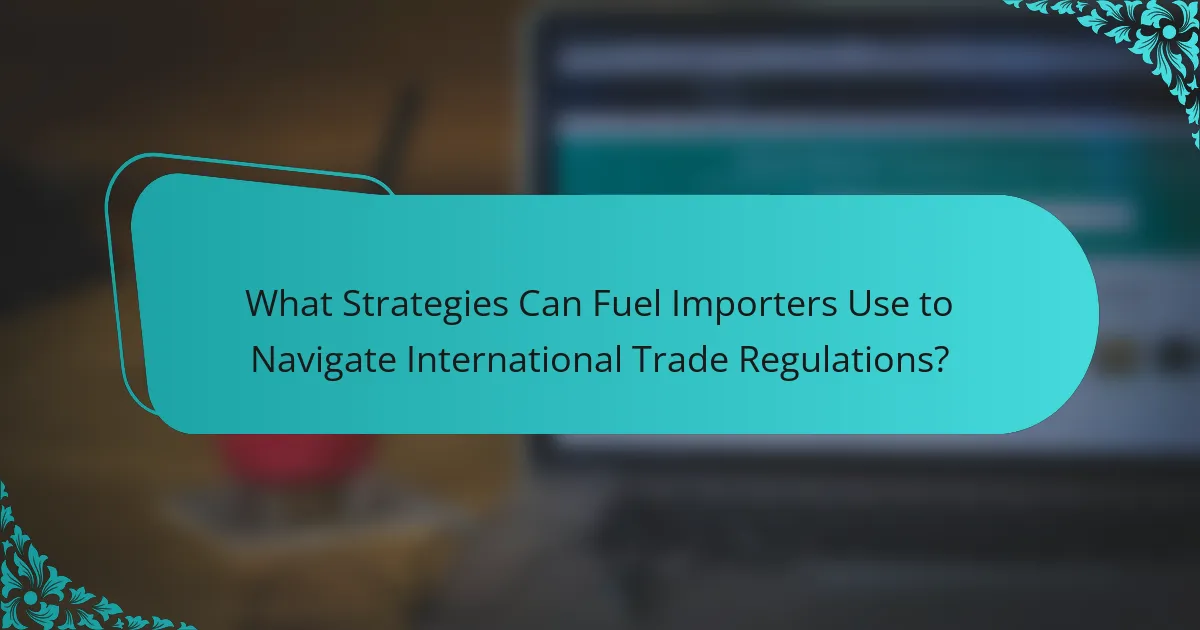
What Strategies Can Fuel Importers Use to Navigate International Trade Regulations?
Fuel importers can use several strategies to navigate international trade regulations effectively. First, they should stay informed about the regulatory landscape. Regularly reviewing updates from trade authorities and industry associations is essential. Next, engaging with legal experts can provide clarity on compliance requirements. This ensures that importers understand the implications of regulations on their operations.
Additionally, establishing strong relationships with customs officials can facilitate smoother transactions. This can lead to quicker clearance times and fewer delays. Importers should also invest in training their staff on regulatory compliance. Educated employees can better manage compliance risks and avoid penalties.
Moreover, utilizing technology can streamline compliance processes. Software solutions can help track regulatory changes and manage documentation efficiently. Finally, joining industry groups can provide valuable insights and shared experiences. Networking with peers can help importers learn best practices in navigating regulations.
How can fuel importers ensure compliance with regulations?
Fuel importers can ensure compliance with regulations by staying informed on legal requirements. They must regularly review national and international trade laws. Importers should establish a compliance management system to monitor regulations. Training staff on these regulations is essential for adherence. Engaging legal experts can provide clarity on complex requirements. Importers must maintain accurate documentation for all transactions. Regular audits can help identify compliance gaps. Finally, leveraging technology can streamline compliance processes.
What best practices should fuel importers adopt for regulatory compliance?
Fuel importers should adopt best practices such as thorough knowledge of regulations, maintaining accurate documentation, and implementing compliance training. Understanding international trade regulations is essential for avoiding penalties. Accurate documentation ensures that all shipments meet legal requirements. Compliance training for staff helps in recognizing and adhering to regulatory changes. Regular audits of processes can identify potential compliance issues. Engaging with legal experts can provide insights into complex regulations. Keeping up-to-date with industry standards and changes in laws is crucial. Collaboration with customs authorities can facilitate smoother import processes.
How can technology assist fuel importers in meeting regulatory requirements?
Technology assists fuel importers in meeting regulatory requirements by automating compliance processes. Automated systems streamline documentation and reporting, reducing human error. Digital platforms enable real-time tracking of shipments and regulatory changes. This ensures that importers stay updated with the latest requirements. Data analytics tools help in identifying compliance risks and areas for improvement. Blockchain technology enhances transparency and traceability in the supply chain. These technologies facilitate quicker audits and inspections, saving time and resources. Overall, technology creates a more efficient compliance framework for fuel importers.
What are the advantages of building strong relationships with regulatory bodies?
Building strong relationships with regulatory bodies enhances compliance and reduces risks for fuel importers. These relationships facilitate better communication regarding regulations and changes. Fuel importers can receive timely updates on compliance requirements. This proactive engagement can lead to fewer penalties and fines. Strong relationships may also provide insights into regulatory trends. Importers can better anticipate changes in the regulatory landscape. Additionally, collaboration with regulatory bodies can foster a supportive environment for business operations. Ultimately, these advantages contribute to smoother import processes and increased operational efficiency.
How can collaboration with government agencies benefit fuel importers?
Collaboration with government agencies can significantly benefit fuel importers by enhancing regulatory compliance and facilitating smoother operations. Government agencies provide essential information on import regulations and tariffs. This knowledge helps fuel importers navigate complex legal frameworks. Additionally, collaboration can lead to expedited customs clearance processes. Faster clearance reduces waiting times and associated costs for fuel importers. Government partnerships can also assist in securing necessary licenses and permits more efficiently. This support minimizes delays in the importation process. Furthermore, fuel importers may gain access to government-funded programs or incentives aimed at promoting trade. These benefits ultimately improve the competitiveness of fuel importers in the market.
What strategies can be employed to influence regulatory changes?
Engaging in advocacy is a key strategy to influence regulatory changes. Advocacy involves mobilizing stakeholders to voice their concerns to policymakers. Building coalitions with other affected parties enhances the impact of advocacy efforts. Providing data and research to support claims is crucial for credibility. This approach has been successful in various sectors, including environmental regulations. For example, the Clean Air Act was influenced by extensive lobbying from environmental groups. Utilizing media campaigns can raise public awareness and pressure regulators. Additionally, participating in public comment periods allows stakeholders to directly influence regulatory processes. These strategies collectively create a robust framework for effecting change in regulations.
What practical tips can fuel importers follow to adapt to changing regulations?
Fuel importers can adapt to changing regulations by staying informed about regulatory updates. Regularly monitoring government websites and industry news is essential. Establishing a compliance team can help ensure adherence to regulations. Training staff on new regulations enhances overall compliance. Collaborating with legal experts can provide clarity on complex regulations. Utilizing technology for tracking compliance can streamline processes. Engaging with industry associations can offer insights and best practices. Finally, maintaining flexibility in operations allows for quick adjustments to new requirements.
The main entity of this article is International Trade Regulations and their impact on Fuel Importers. The article provides a detailed examination of how these regulations govern the importation of fuel, including aspects such as tariffs, quotas, compliance costs, and the implications of trade agreements. It outlines the challenges faced by fuel importers, such as varying regulations across countries and the complexities of compliance, while also discussing strategies for navigating these regulations effectively. Key topics include the effects of tariffs and quotas on pricing and market stability, as well as best practices for ensuring regulatory compliance and fostering relationships with regulatory bodies.
